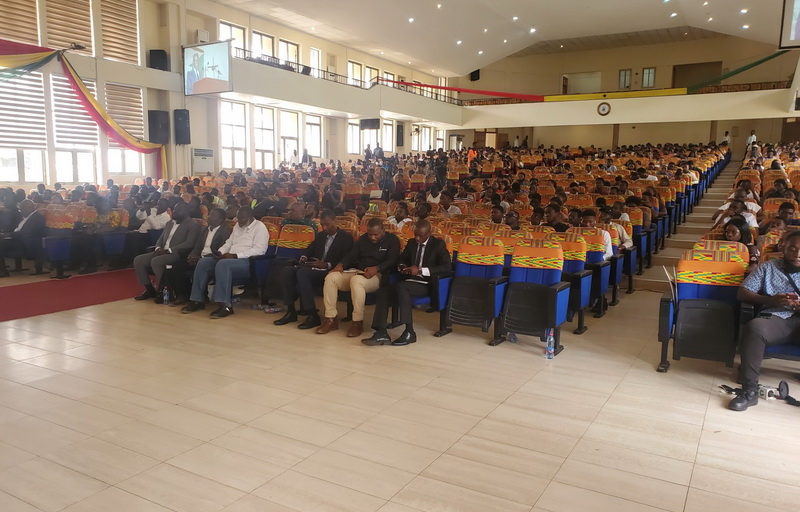President, Nana Akufo-Addo will soon cut sod for work to start on a $450 million manganese refinery at Nsuta in the Tarkwa Nsuaem Municipality of the Western Region.
Lands and Natural Resources Minister, Samuel Abu Jinapor, who announced this said the Government had already concluded negotiations with the majority shareholder of Ghana Manganese Company Limited.
The refinery would upgrade the quality of manganese from the current 27 percent to about 40 percent, leading to the production and export of various refined products, including battery grade manganese, one of the key components in the production of batteries for electric vehicles and energy storage systems.
Mr Jinapor announced this in Tarkwa at the opening of the 8th University of Mines and Technology (UMaT), Tarkwa Biennial International Mining and Mineral Conference.
The event was on the theme: “Innovations in Mining and Mineral Processing: Expanding the Frontiers of Mining Technology”.
The move, according to the Minister, clearly demonstrates the government’s preparedness for value addition to critical minerals produced in the country, adding that "We believe, this will result in economic diversification and job creation, and position the country to leverage her mineral wealth to drive industrialization and enhance our competitiveness on the global stage."

The minister said it was imperative to invest in a comprehensive geological investigation to identify and quantify their critical mineral resources, as a basis for a diversified and information-based mining sector.
Investment in infrastructure, technology, and human capital to support the development of a robust minerals value chain and institutions such as the UMaT, he said, should continue to promote research and development, and institute appropriate skills and training programmes to produce the capacities and facilities to build and manage processing plants to add value to the critical minerals they produced.
He said they must train people to acquire the necessary expertise and wherewithal to add value to their minerals locally and develop innovations that make value addition to these minerals more cost-effective, efficient, and easy.
Mr Jinapor continued that the government had already put in place the policy and regulatory frameworks to incentivize and support investment in value-added activities.
"The Green Minerals Policy approved by Cabinet, for instance, provides for incentives for investments as one moves higher on the value chain of the industry.
“These incentives can only be harnessed if we build the necessary technologies and innovations that make value addition in Ghana competitive and cost-effective," Mr Jinapor said.
Academic institutions, the minister noted, must drive research that would lead to the requisite innovation and development of products and services based on their resources, which would bridge globally available technology to meet the needs locally and beyond.
He emphasised that Ghana's path forward in the critical minerals industry was based on the intensification of research and development for value addition to its resources.
According to Mr Jinapor, greater collaboration was required between regulators of the industry, industry players, universities and research institutions, the private sector, and international partners saying that “Adding value to our critical minerals is not just desirable, but crucial to reaping their full benefits for national development.”
"These minerals are not just commodities, but enablers of progress. Prioritizing their value addition will enhance our competitiveness in the mining industry, and contribute, significantly, to socio-economic development, and unleash the much-desired prosperity for our people. The Government, obviously, cannot do it alone. public-private partnership is, therefore, crucial, to drive investment in smelting, refining, and manufacturing."
The minister, therefore called on all stakeholders to work together to unlock the full potential of their mineral wealth, ensuring prosperity for all Ghanaians.
Professor Richard Kwasi Amankwah, Vice Chancellor of UMaT, said the objective of the conference was to create a platform where researchers, engineers, academics and all people who were interested in mining and innovations came together to discuss their research and present findings.
He added that they would have authors and presenters who would take care of about 20 different presentations of their research and ideas as to how to move the minerals industry forward, which was a significant issue for the University.
Latest Stories
-
I want to focus more on my education – Chidimma Adetshina quits pageantry
1 hour -
Priest replaced after Sabrina Carpenter shoots music video in his church
1 hour -
Duct-taped banana artwork sells for $6.2m in NYC
2 hours -
Arrest warrants issued for Netanyahu, Gallant and Hamas commander over alleged war crimes
2 hours -
Actors Jonathan Majors and Meagan Good are engaged
2 hours -
Expired rice saga: A ‘best before date’ can be extended – Food and Agriculture Engineer
2 hours -
Why I rejected Range Rover gift from a man – Tiwa Savage
2 hours -
KNUST Engineering College honours Telecel Ghana CEO at Alumni Excellence Awards
2 hours -
Postecoglou backs Bentancur appeal after ‘mistake’
3 hours -
#Manifesto debate: NDC to enact and pass National Climate Law – Prof Klutse
3 hours -
‘Everything a manager could wish for’ – Guardiola signs new deal
3 hours -
TEWU suspends strike after NLC directive, urges swift resolution of grievances
3 hours -
Netflix debuts Grain Media’s explosive film
3 hours -
‘Expired’ rice scandal: FDA is complicit; top officials must be fired – Ablakwa
4 hours -
#TheManifestoDebate: We’ll provide potable water, expand water distribution network – NDC
4 hours

